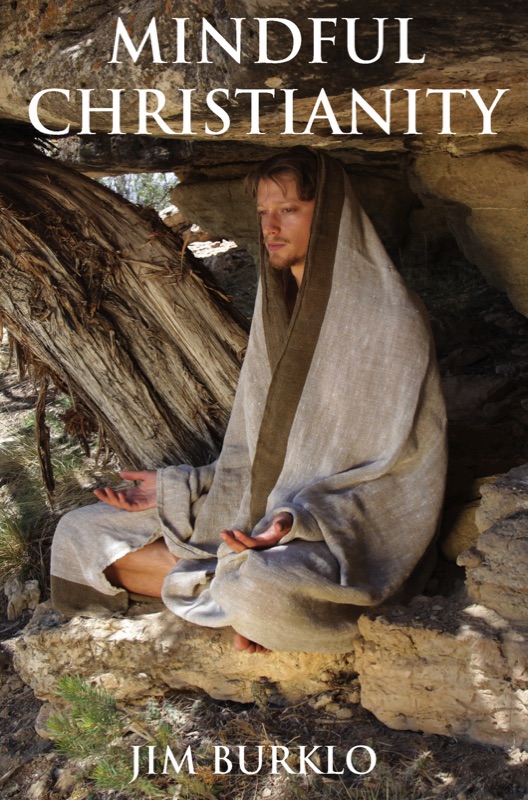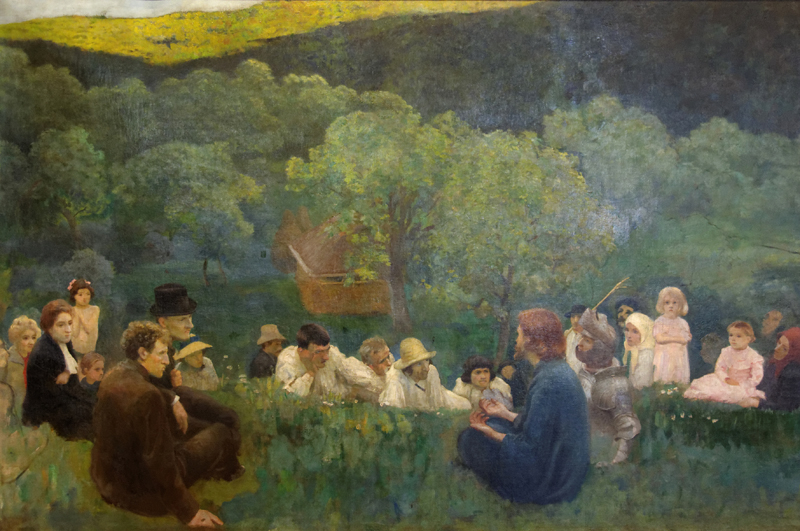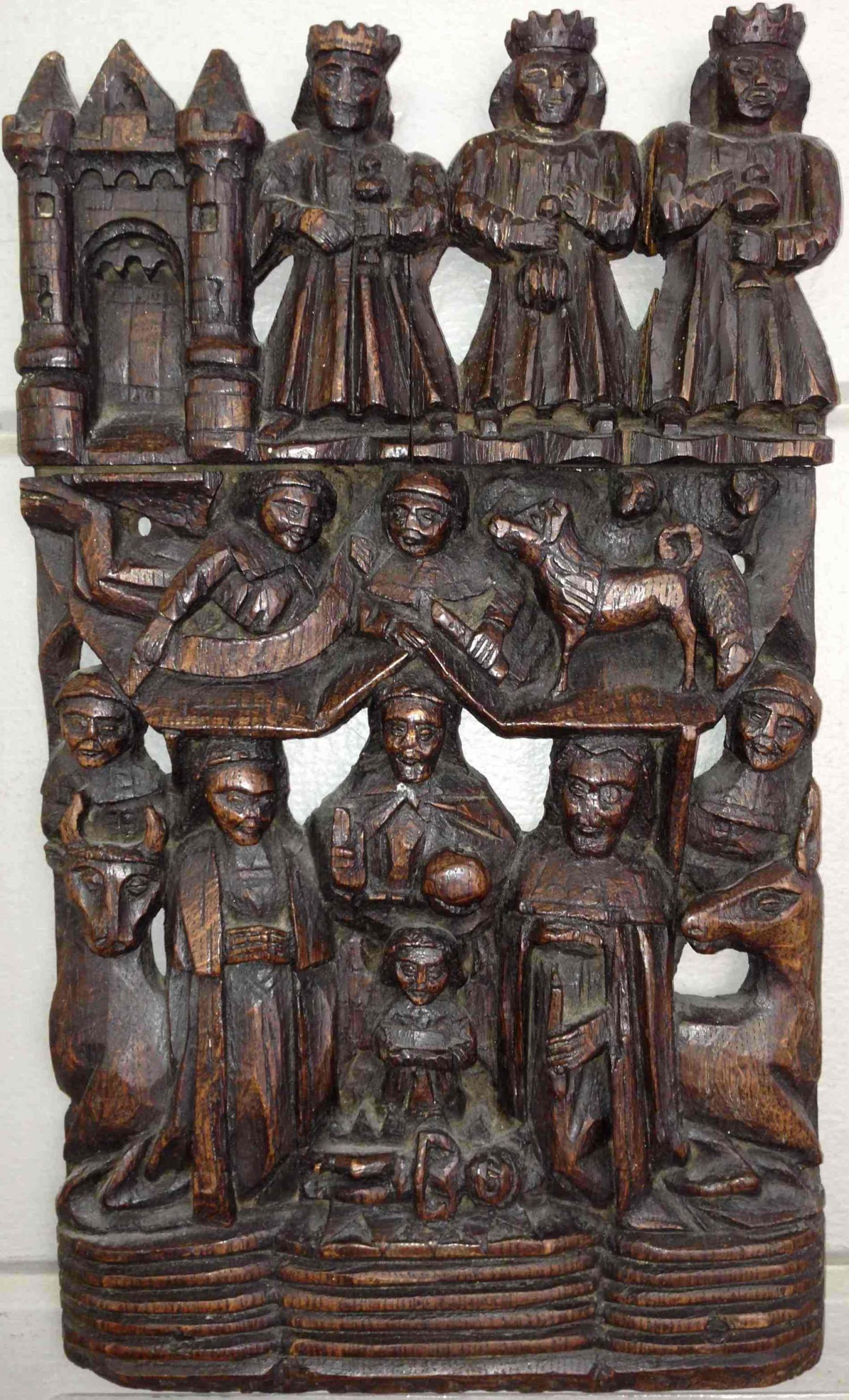From the Greek word, hypocritis, the hypocrite is a ‘play actor.’ While misfortune is befalling us on a massive scale these days, true tragedy is the result of the hypocrite who has the choice to decide to act otherwise.
The Problem with Blessings and Curses
“Have a blest day?” What in this world does that mean? Better luck or good karma, instead of bad? In the ancient world, denoting someone as “blest” was a way of expressing a deity’s special favor towards that person. If that sounds quaint, there are still plenty of people today who believe they can curry favor or improve the odds of achieving more blessings than curses; while politicians routinely conclude their speeches by invoking the Almighty to bless the good ‘ol USA. There’s just one problem. It doesn’t work.
The challenge for a progressive Christian who has moved beyond such notions as virgin births and gods disguised in human form come to save us from ourselves is to remember that it is as much a historical development, as it is a theological one. That is, the attribution of a “Christ” title accorded a very human Jesus constitutes the imaginations -- if not machinations -- of an early Church; consisting of very human, second-generation followers of a 1st century Galilean peasant sage and itinerant preacher. And who all but drowned out the authentic voice of the one who was once born and dwelt among humankind. Such an assertion is simply based on the fact the historical Jesus never self-identified as the “anointed one,” the Christ. As such, if one were to remove the Christ-title from the various birth narratives of those secondary traditions of this religious movement, what would remain of the “Christmas story” that has become as prevalently assumed, as it has been unexamined? If we took the Christ out of Christmas, what might remain of the voice of one who was born and dwelt among us? You can read more here.
Mindful Christianity is mysticism: the experience of a human being in spiritual union with the divine, seeing each other with the same eye. The observer within you, when you are deep in mindfulness meditation, is God. God is lovingly attentive toward your every experience, every feeling, urge, and thought. In mindfulness practice, God notices all of that is going on inside of you, with deep compassion and without judgment.
The idea of a second coming of Christ is a mystery, if not explicitly controversial. Jesus’ followers apparently believed he would return during their lifetime after he was crucified. When that didn’t happen, later followers gradually changed the belief into an indefinite “someday.” After two thousand years of waiting, most Christians no longer look for it to happen in their lifetimes and acknowledge that Jesus may have been speaking metaphorically about his return. It is just as likely that those words were put into Jesus’ mouth by the gospel writers themselves. Wishful thinking?
The terms faith and beliefs are sometimes used interchangeably, but I think it is useful to make a distinction between them. Beliefs are things you think are true, like “I believe in God.” “I believe that there is life after death.” These are improvable opinions (or they would be accepted by all as “facts”). A list can be made of beliefs.
Series on the Teachings of a Galilean Sage: The Sermon on the Mount, PART II
The social world order seems to erupt in chaos and violence on a regular basis these days. Regimes hold on to political power at all costs, while those who are more often than not economically oppressed demonstrate and confront government forces with little more than their willingness to stand in opposition. If this all sounds like pure political commentary, consider this: The socio-political landscape in first century Palestine, CE, wasn’t much different. The practical means by which the imbalance of power was wielded by some over others may have been rather primitive by today’s technological standards; but the end game was the same. The itinerant Jewish peasant teacher and sage who would long be remembered as uttering such impractical non-sense as “turn the other cheek” and “love your enemy,” was the same historical figure that was executed as an insurrectionist, not a “resurrectionist.” As I’ve put it bluntly elsewhere, Jesus didn’t die for our sins, but because of them. But the historical Jesus’s message deviated so radically from the “you have heard it said, but I say to you” literary device employed that it constituted a world view that did not simply turn everything upside down; but attempted to right what becomes a distorted “default” assumption of human nature that too easily concedes it is only human instinct to regard ourselves as prejudicial and self-centered creeps. Jesus’ teachings to “turn the other cheek” and “love one’s enemies” is an invitation to an inward journey of the self; and a call to reclaim our true huma n nature.
Contrary to the custom of the period, Jesus accepted women among his followers. Although none of the women are ever identified as “disciples,” certain gospels passages indicate that some of them may have been equal to the disciples, particularly Mary Magdalene. Mark writes that women followed Jesus in Galilee and ministered to him (Mark 15:40-41). Like Mark, Matthew 17:55 refers to women who “followed Jesus from Galilee, ministering to him.” Luke 8:1-3 mentions that Jesus and the disciples were accompanied by women and he specifically mentions Mary Magdalene, Joanna, the wife of Herod’s steward Chuza, Susanna, and many others, “who provided for them out of their own resources” (meaning that they must have had considerable wealth). Jesus’ death and the events accompanying it mention the presence of women and some of those women witnessed the crucifixion, Jesus’ burial and the discovery of the empty tomb. Pope Benedict XVI considered it an obvious fact that “many women were also chosen to number among the disciples.”
Most people assume that the Bible is filled with stories of supernatural happenings and miraculous interventions. The accounts of miracles in the Bible are generally limited to three cycles of stories: the Moses-Joshua cycle in the Torah, the Elijah-Elisha stories that are recorded between I Kings 17 and II Kings 13, and the Jesus-Disciples of Jesus stories that are found in the four gospels. There is an occasional supernatural tale in other parts of the Bible, but these are the only areas where they are concentrated. Our concentration is primarily on the miracles that are attributed to Jesus in the gospels. The reported supernatural deeds performed by Jesus during his ministry can be categorized into four groups: cures, exorcisms, raising the dead, and nature control. Interestingly, each type of miracle that is attributed to Jesus in the gospels also occurred in the Moses-Joshua and Elijah-Elisha stories.
A Commentary for Thanksgiving in an Age of Anxiety
American retailers have essentially pre-announced that the annual Thanksgiving observance -- when we presumably pause to gratefully remember everything we have -- has been cancelled so bargain shoppers can get an even earlier jump-start on their holiday shopping for all the things we don’t have yet. Meanwhile, halfway around the world a typhoon of record proportion hit landfall only a few weeks ago; nearly wiping an island nation off the face of the earth, and leaving those who survived with virtually nothing. Then last week an unseasonable swarm of twisters flattened whole towns across the Midwest. By comparison, it all makes the plight of those first pilgrims facing the harsh realities of their first Thanksgiving in a brave new world look like a walk in the park. And, all the while, the airwaves and media have been filled with docu-dramas and documentaries commemorating the half-century mark of those events that shattered an age of relative innocence for those of us old enough to remember it; ushering in an age of extraordinary upheaval and anxiety, starting with what social critics and historians alike attribute to the assassination of JFK. Juxtaposed and taken together, these events represent a seeming un-reality that hasn’t really abated much in the last fifty years. We live in an age of anxiety. Jesus masterfully taught in the philosophical tradition known as Jewish cynicism, with such parabolic tales and quaint-sounding imagery as the “lilies of the field.” And he did so at a time and age that – while seemingly ancient to our modern way of thinking – may not have been all that different from our own anxious age. Consider then our fretful, misbegotten ways, and the wild lilies of the fields.
Part One in this series considered the notion of “God,” or “gods,” as the single most elusive idea the human imagination has ever concocted or tried to fathom. But we typically constrain ourselves, thinking only in theistic terms; and fashion our notion of “God” in an anthropomorphic image so we can more easily relate to the idea. We ascribe to such a being all kinds of desirable characteristics that might comprise this composite character. The Christian then proceeds to incarnate that idea with a Christology in which Jesus is typically construed as mediator and chief negotiator; to the extent such a savior is willing to atone for all our wretchedness and secure our own immortality in another existence. It’s all pretty fanciful stuff. But for those progressives for whom such a construct is no longer viable or credible, it is not simply a question of what remains amidst the theological rubble, but what more, or other, might yet be discovered? As such, we ask how we might speak of such things. What language might we use?
Once upon a time, political conservatives in America were stereotyped as hard-headed realists, and liberals were described as ungrounded dreamers. How times have changed!
Traditionally this is a time to learn from our mistakes and commit ourselves to do differently in the new year. I wonder what





















